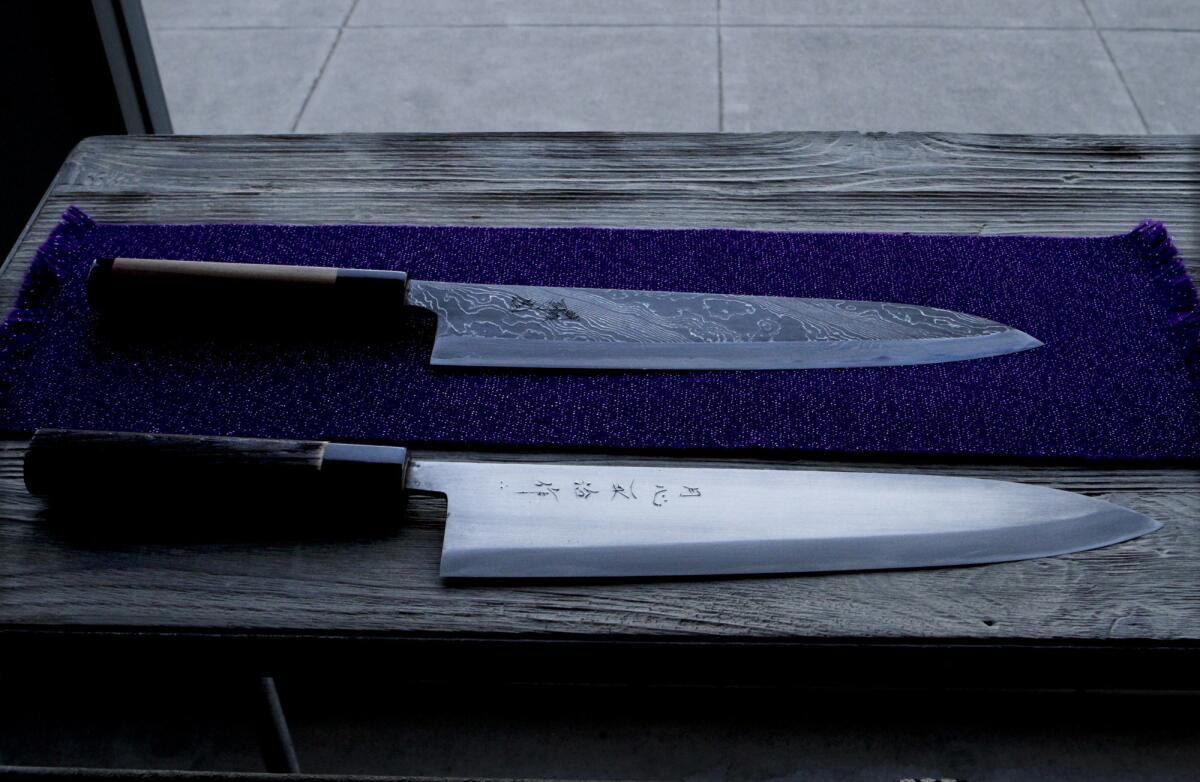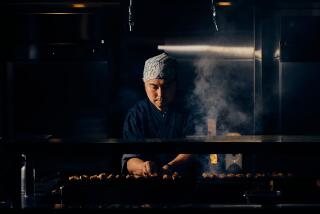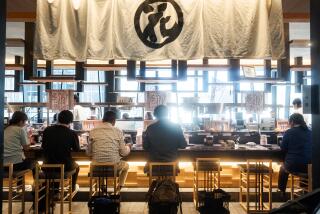Wrap your knife in a newspaper, and other tips from a master Japanese knife sharpener

Tsukasa chef knife , top, and Gesshin Heiji chef knife are for sale at Japanese Knife Imports in Beverly Hills.
- Share via
“The traditional test to see whether a knife is sharp is to reach behind your head and cut into a hair,” Jonathan Broida, owner of Japanese Knife Imports, explains at a knife sharpening demonstration at his Beverly Hills Shop. “Don’t try it here,” he cautions.
It’s not every day that a third-generation master knife sharpener from a company with roots back to the 17th century comes to town. Broida had invited Mamoru Morimoto from the knifemaking town of Sakai, Japan, to give a demonstration to his customers.
Taught by his father and his grandfather, Morimoto was certified as a Master of Japanese Traditional Crafts for blade grinding and sharpening by Japan’s Ministry of International Trade and Industry in 2012. That’s a very big deal.
SIGN UP for the free In the Kitchen newsletter >>
For two hours Morimoto showed a group of 30 chefs and knife enthusiasts how to sharpen both double-beveled and single-beveled Japanese knives. He also had some tips about caring for knives that every cook should know.
1. When using water stone to sharpen a knife, it’s most important to make sure that your stone is as flat as possible. If it’s not, use a lapping tool to flatten it. One type sold at Japanese Knife Imports is an aluminum plate with a diamond-textured surface.
2. To sharpen a double beveled knife, such as a chef’s knife or petty knife, lay two quarters on the surface of the stone to help get the angle for the sharpening exactly right.
3. In sharpening the knife, the pressure should be on the edge trailing (stropping) stroke. It’s fascinating to watch the master’s fluid motion as he presses two fingers on top of the knife and moves them up and down the blade as he sharpens it against the stone.
4. The slight burr formed on the opposite side of the knife during the sharpening should be roughly the same size all along the blade from the heel to the tip.
5. To test whether the knife is sharp, cut into a hair. If it “catches” on the hair, that blade is sharp. A safer option is to place the edge of the blade against your thumbnail at a 90-degree angle and pull it just slightly. The blade should catch against your thumbnail.
Everyone’s expectation of sharpness is different, but as you get into sharpening your own knives, Broida explains, that perception will change.
“Once you get used to a truly sharp knife, you’ll begin to sharpen more and more and more. Sharpening your knife every day after you use it will raise your awareness of your knife’s edge condition.”
During the question-and-answer session, Morimoto gave tips on caring for knives once they’re sharpened.
1. In order not to rust, carbon steel blades need to be wiped with a clean dry towel. You’ll see Japanese chefs do it often. It’s very important that your knife is clean and dry when you’re done using it.
2. If you oil the blade when you store it, make sure your mineral oil doesn’t have any salt in it. Avoid vegetable oil or animal fat because they can go rancid. Camellia oil is the best one to use. Spray it on and then wipe it away with a cloth before putting the knife away.
3. For knives with wood handles and carbon steel blades, store with the blade down, so no moisture gets inside the handle.
4. If you’re going to store a knife for a longer period of time, wrap it up in newspaper. The oil in the ink helps prevent rust over time.
5. Home cooks should have their knives professionally sharpened every once in awhile to ensure proper edge geometry and good knife care. Chefs should sharpen their knives every day and only come in to have their knives professionally sharpened when there’s a problem with a blade.
Broida has put up a whole series of YouTube videos that show everything you’d ever want to know about knife sharpening in great detail.
Japanese Knife Imports, 8642 Wilshire Blvd., Beverly Hills, (310) 399-0300, www.japaneseknifeimports.com.
Follow @sirenevirbila for more on food and wine.
ALSO:
Knife expert hopes to sharpen up chefs
13 great places for food lovers in Beverly Hills
Try over 200 kinds of gin at the Flintridge Proper
More to Read
Eat your way across L.A.
Get our weekly Tasting Notes newsletter for reviews, news and more.
You may occasionally receive promotional content from the Los Angeles Times.










